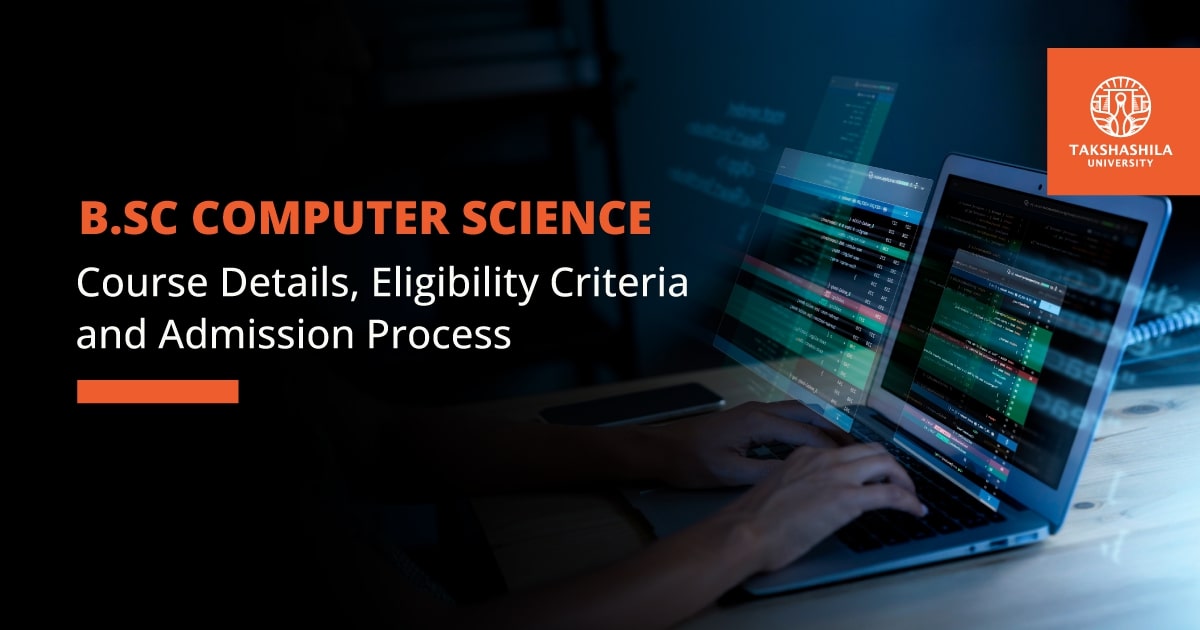Introduction to BSc Computer Science
Would you like to see the world of computers as an artistic problem and try to devise ways to solve it? If that’s the case, a BSc in Computer Science at Takshashila university is ideal. The ever-popular area of study, Computer Science, has numerous career opportunities in software engineering, robotics, cyber security, artificial intelligence, and data analysis.
This three-year undergraduate program will equip you with computer science, coding, and computer system architecture fundamentals while enabling you to learn how to create apps, software, and systems in demand in the modern digital ecosystem.
Let’s look at all the details, such as B.Sc Computer Science: Course Details, Eligibility Criteria, and Admission Process will be explained in this article.

Overview of the B.Sc Computer Science Course
The B.Sc in Computer Science course aims to impart knowledge on computer systems, programming, and resolving numerous challenges. This course will familiarise you with the programming environment, various programming languages, algorithms, data structures, computer networks, etc.
In the first year, the students will be taught the basics of programming, math and how to design the computer. In the second year, the students learn more about other general topics, such as data structures, algorithms, and web technology. In the third year, the students acquire communication skills, work on advanced courses such as AI, ML, and database management, and do some research and projects as practical applications of previously learned knowledge.
Key Concepts in Computer Science
- Programming Languages: Coding forms a big part of computer science, and learning C allows you to do software development and work with applications like C, C++, Java, Python, and many others. Re: This is how the data is organised and stored when manipulated—for example, arrays, linked lists, stacks, and queues. These concepts are essential to acquire when approaching different problem-solving tactics.
- Algorithms: Algorithms are used to solve problems and are o, and they are step-by-step life changes that undertake this life-changing activity. Interest in how algorithms are designed and optimised to perform their activities with speed and efficiency.
- Database Management Systems (DBMS): Another important domain within CoComputer Science is how data can be organized, stored, retrieved, and retrieved when needed, a working knowledge of databases such as SQL and NoSQL and how to use them.
- Operating Systems: This includes the software that governs a computer’s hardware and software resources, what the operating systems are, and how to use them.
- Computer Networks: This studies how computers establish connections and exchange data with the internet and related networks. The students will learn about networking protocols, security and data transfer.
- Software Engineering develops the ability to create, design, and modify a software application—the student’s knowledge of the software lifecycle, its testing, and quality assurance.
Emerging Fields in Computer Science
- The global tech environment does not remain different areas of Computer Science that are equally interesting. Listed below are some of the new fields that are on the upward trend among students and practitioners in the field today:
- Artificial Intelligence and Machine Learning: AI and ML are (AIolution) sizing business sectors by allowing machines to adapt based on data and make decisions. They have applications in self-driving vehicles, chatbots, recommendation engines, and many more fields.
- Cybersecurity: Due to the relentless growth of digital vulnerability, cybersecurity specialists are in greater demand. You will learn to defend systems and networks from intrusions and cyber warfare.
- Cloud Computing: On the Internet, cloud computing provides users with computing services that can include storage, networking, and processing. It’s an emerging area where companies such as Microsoft Azure or Amazon Web Services (AWS) seem to offer incredible prospects.
- Data Science: Data scientists apply scientific methods to large amounts of data to find points that will improve organisations’ working processes, using statistics and machine learning.
- Blockchain Technology: Blockchain is a distributed ledger technology that makes transactions secure and transparent. People mostly relate it to the cryptocurrency Bitcoin, but it has other applications, including supply chain management and voting.
- Computer science opens science contacts and expectancies in the field of information and technology and many careers, as well as aspects.
Career reunites in Computer Science.
- A B.Sc in Computer Science opens the door to numerous career opportunities in the tech industry and beyond. Here are some popular career paths for Computer Science graduates:
- Software Developer: Design, develop. This person designs, develops, and maintains applications and systems. These people are employed in a number of different ways.
- Web Developer: They create websites and websites and update and maintain existing ones. There are languages such as HTML, CSS, and JavaScript, among other frameworks, that web developers utilise. Scientist: Using computer programming, mathematics and statistical tools to manage vast amounts of data for business and research purposes.
- System Administrator: Troubleshooting and responding to issues with the organisation’s systems and networks and ensuring all operations run effectively.
- Network Engineer: Crafting, activating, and administering networks that enable computers to converse with one another.
- Cybersecurity Analyst: Safeguarding computer systems, networks, and information from threats. For instance, hackers, malware, phishing and others.
- AI/ML Engineer: Designing algorithms and models which enable computers to learn from data and make decisions that are deemed reasonable.
- Mobile Application Developer: Creating mobile applications for Android and iOS platforms, among others, using programming languages such as Java, Kotlin, and Swift.
- Game developer: This occupation is commonly defined as a person who redesigns and creates graphics, sound, and game mechanics).
Eligibility Criteria for B.Sc Computer Science
For the Bachelor of Science Computers, the following are some of the set qualifying criteria:
- Educational Qualifications: To be eligible for the B.Sc in Computer Science, you must have finished your higher secondary education, which includes science, mathematics, physics, and possibly computer science or informatics practices as core subjects.
- Minimum Marks Required: Most education expect students to have achieved about 50-60% in their 12th standard examination, but this can vary from college to university.
- Age Limit: it is mostly tre limit for B.Sc limitster Science, but one should have crossed higher secondara y level of schooling.
Skills Required for B.Sc Computer Science Students
To be effective in B.Sc Computer Science, you will need to have a combination of soft skills and technical skills:
- Programming Skills: Thus, it is imporessentialave some knowledge of programming languages such as C, C++, Python, or Java which can be h, helpful since you’ll be coding during the class.
- Analytical Thinking: The processes of programming and system designing require the ability to decompose a broader perspective and focus on smaller tasks.
- Attention to Detail: Code bugs are a common cause of system failures. Therefore, this industry requires a high degree of attention to detail.
- Mathematics Skills: Areas such as algorithms and data structures in Computer Science are mathematically intensive.
- Communication Skills: In any project whe,ther working in a team or presenting a project, one must communicate effectively which is vital in the tech world as well.
- Curiosity: The tech realm is one that is dynamic hence it is essential to have that urge to always learn about emerging technologies and trends.
Why Choose Takshashila Engineering College for B.Sc Computer Science?
Although there are many institutions offering similar programs, Takshashila Engineering College remains the best option for students pursuing a B.Sc in Computer Science due to:
State-of-the-Art Infrastructure: The most advanced computer labs with modern hardware and software tools are offered in the colleges making it possible to have practical exposure to the technology encountered in the industry.
Experienced Faculty: All the faculty members of Takshashila possess sound qualifications and experience, which enables them to impart both theoretical and practical knowledge in class.
Industry Collaborations: Due to the industry collaboration with many leading tech firms, Takshashila offers its students further options for internships, projects, and job placements in the best corporations.
Research Opportunities: It further advances the vision of the Institute of Takshashila by motivating students to indulge in R&D activities so as to be ahead of the development taking place in the industry.
Holistic Development: As a college student, it is possible to go beyond the confines of academies and engage in other related pursuits such as talking in extracurricular activities, attending seminars, and attending workshops organized by the college.
Enrolling in Takshashila Engineering College guarantees not only the academic knowledge but also the skills and networks requisite for a successful career in the technology field.
Admission Process for B.Sc Computer Science
- Moving on, the admission process for BSc in computer science is most commonly carried out in the following steps.
- Application: Start the application process by completing an enrollment application, which includes the relevant personal and educational information about yourself.
- Entrance Exam: A few colleges set threshold entrance exams, which may include questions from Mathematics, Physics, Computer Science, etc.
- Merit List: Colleges announce the merit lists on the bases of the apbasisnts’ entrance test results or 12th standard percentage. In case the applicant qualifies, the applicant is called to take another step.
- Counselling/Interview: Counselling sessions are conducted by certain colleges, or sometimes interviews are conducted to determine how keen the applicant is on studying that particular course.
- Final Admission: In conclusion, the selected candidates have to undertake the formal admission procedures like document submission, payment of fees, etc.
Curriculum and Course Structure
The curriculum for B.Sc Computer Science is usually spread over three years, with each year focusing on different The B.Sc Computer Science program has a typical duration of three years broken down into the following parts:
Year 1: This includes the basic programming skills, computer system as well as mathematics that is of a general nature. In addition, knowledge on operating systems and web technologies will also be gained during this period.
Year 2: Go into more detail about data structures, algorithms, databases and software engineering, web design, and programming languages as you study Java or Python.
Year 3: Specialized subjects, including artificial intelligence or machine learning, computer networks, and cybersecurit,y will be included, and final projects that are assigned or an internship done to demonstrate what has been taught.
Top Institutions for B.Sc Computer Science
Some of the top institutions offering B.Sc Computer Science include:
- Takshashila Engineering College
- Indian Institute of Technology (IIT)
- University of Delhi
- University of Mumbai
- St. Xavier’s College, Mumbai
- Jawaharlal Nehru University (JNU)
Scope and Future of Computer Science Graduates
According to various reports, Computer Science graduates are the most employable of all graduates, with an abundance of job openings existing in all fields of work. Graduates can work as software developers, data analysts, cyber security experts, AI/ML engineers, and many more. The industry is growing, and if you get additional education, such as a master’s degree in computer sciences or data sciences, you can have knowledge of advanced technologies and many specialisations available that are in great demand. Benefits of Studying Computer Science High Demand for Professionals: As the world becomes more technologically advanced, computer science professionals will always be in great demand.
Benefits of Studying Computer Science
- High Demand for Professionals: With technology continuing to grow, there is a consistent demand for computer science professionals.
- Diverse Career Options: Graduates can pursue careers in a number of job areas including software engineering, cyber security and so on.
- Lucrative Salary: Most tech jobs are well-paying and offer avenues for growth and career development
Challenges Faced by Computer Science Students
- . Challenges Faced by Computer Science Students Keeping Up with Rapid Changes: Technologies are developing quickly, and so do need to understand and learn how to use them.
- Complex Problem-Solving: Certain fields of computing, specifically algorithms and data structures, are quite intricate and call for constant practice.
- Heavy Workload: This especially occurs when combining projects, assignments, and exams, and great organizational skills can come in handy.
Postgraduate and Research Opportunities
After completing a B.Sc in Computer Science, you can pursue:
- M.Sc in Computer Science
- M.Tech in Software Engineering
- Ph.D. in Computer Science (for those interested in research)
These advanced programs can help you specialise in a particular area, such as AI, cybersecurity, or data science.
Conclusion
If you find computer systems interesting, problem-solving materials and technologies enjoyable and if you are considering a career in technology, then pursuing a B.Sc in Computer Science is a wise choice. You will have completed all the requisite education and training in programming, software engineering, and systems engineering to begin a fulfilling career in the industry. With Takshashila Engineering College, you will learn how to combine education, industry exposure and the necessary skills to succeed in this booming profession.
If you have any further queries regarding the fee structure, contact Takshashila mentors today !
FAQs
1.What is the duration of the B.Sc Computer Science course?
Normally three years is the duration for taking this course with first year being introductory perspectives in computer science, with advanced computer courses being focused on in the second and third years.
2.Do I need a background in mathematics?
Yes. Good knowledge of mathematics is required, especially because of its application in algorithms, data structures, and encryption.
3What potential fields of work are there for candidates who possess a B.Sc in computer science?
One can have a job as a software developer, web developer, data
scientist, cybersecurity analyst, network engineer, and much more.
4.Does the B.Sc Computer Science program have an entrance test?
While some of the colleges have their entrance examinations, the others follow the marks obtained in the 12th standard.
5.Which college degrees can I study after completing my B.Sc in Computer Science?
Yes, you can proceed to themasters degree primarily an M.Sc, M.Tech, or even a doctoral degree as Ph.D in Computer Science for further depth study.






